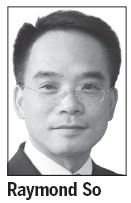China's economic change will be slower
Updated: 2013-01-31 06:03
By Raymond So(HK Edition)
|
|||||||
In economics, there's a famous theory called "Lewis Turning Point." Basically, it is about the change in economic structure as a result of industrialization. The theory is put forward by the Nobel laureate in economic sciences, Arthur Lewis, in the 1950s. According to the theory, at the beginning of industrialization and economic growth, urban employment attracts workers from rural areas. Since salary and wages in cities are higher than those in the countryside, the attraction for moving into cities is great. As a result, the outflow of the workforce from rural areas to the cities is high. This large infusion of labor into the city, however, helps to supply the much needed workforce for industrialization. Therefore, even though there is a large inflow, the boom of industrialization can absorb labor easily and there is no increase in wages. The industrialization benefits from cheap labor and expands rapidly.
Nevertheless, there is a limit to this process. Up to a certain point, the labor needed for industrialization starts to exceed the supply of workers from the countryside. To a certain extent, it can be the case that excess labor from the countryside is far less than the demand from the city. Because of this, salaries and wages in the city start to increase. The old days of cheap labor for industrialization are gone. The period at which salary and wages during industrialization starts to increase is known as the "Lewis Turning Point".
When an economy has reached the "Lewis Turning Point", a typical event is that the economic structure will change. As mentioned above, the early stage of industrialization can absorb the large inflow of labor from the countryside and will not cause large increase in labor costs. After reaching the "Lewis Turning Point", salary costs starts to increase in the city. This can have both good and bad effects.

On the positive side, the increase in labor costs will force industries to improve and upgrade. The early pace of development usually is attributed to cheap labor, but when labor costs are no longer cheap, industries need to upgrade and go toward the higher end. This, in turn, will have a positive impact, forcing industries to reform and improve to reach a higher level of achievement. This change in direction is caused by market forces, leading the process of industrialization to go from the low end to the higher end.
Another positive impact is the rise of a more affluent class. As salary starts to increase, people earn more and spend more. A middle class emerges. This change in social structure will also lead to a change in the economic structure. The rise of the middle class, together with increases in salary, will lead to the transformation of the economy from a production-based one to a consumption-based economy. Consumption becomes a more important component in the Gross Domestic Product.
Nevertheless, just like any change in the social structure, economies passing the "Lewis Turning Point" will also have to overcome some problems. The most notable problem is income inequality. Once a group of people starts to emerge as the middle class, the distribution of income across the economy will widen. No doubt the widening of the gap between the rich and poor will pose challenges to the society. Hence, there should be government policies to help relieve the negative side effects. At the very least, some tax reforms with the objective of income redistribution are inevitable.
In Asia, Japan passed the "Lewis Turing Point" in the 1960s. South Korea passed it in the early to mid-1990s. Both Japan and South Korea managed to upgrade their economic structures and become fully industrialized countries. When we look back, China seems to have reached the "Lewis Turning Point", as many cities have started to have labor shortages and the middle class starts to emerge in China. Nevertheless, China is a much larger country than Japan or South Korea. Although China is now at the "Lewis Turning Point", it will take some time for it to fully transform herself. The stories of Japan and South Korea definitely will repeat again in China. However, the pace can be slower. It's not about China being inferior to Japan or South Korea. It's China's size that makes its transformation longer.
Raymond W. So is Dean, School of Business, Hang Seng Management College.
(HK Edition 01/31/2013 page9)